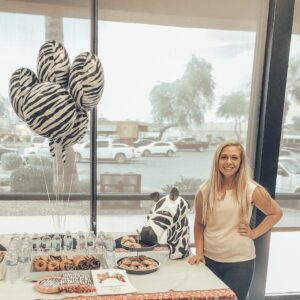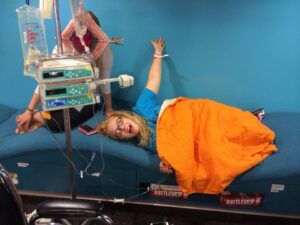Feb. 29, 2020
TOPIC: Featured News, Advocacy, Patient Stories, Rare Disease Day
Ashlee’s Story in honor of Rare Disease Day
Posted by Valaree DonFrancesco

I was diagnosed with primary immunodeficiency when I was four years old. With primary immunodeficiency, the assumption is that “it’s just an infection” or that it’s normal because “kids get sick.” The problem was that I was never getting better and was fighting for my life every time I was sick. It took countless life threatening infections and misdiagnoses before my pediatrician heard the hoofbeats of another infection and realized he was hearing a zebra and not a horse. After getting diagnosed, I then started a treatment called IVIG. With treatment and continued check ups, the outcome of my disease is very positive and I manage to live a semi-normal life. My treatment is in no way easy and comes with a list of side effects but I’m so incredibly thankful to even be getting a treatment that keeps me out of the hospital.
However, receiving a diagnosis with a rare disease is only half the battle. All throughout my life I have struggled with feeling alone, misconceptions regarding my disease, and anxieties regarding the future that come with having a rare disease. Being rare was always something I was proud of and I have always felt very comfortable with discussing my disease and story. What I struggled with the most growing up with a rare disease was loneliness. I was not like other children and spent a majority of my childhood in a hospital or doctor’s offices. I didn’t meet anyone with my disease until I was around 12 years old. I still remember the excitement I had when I finally met someone that understood how hard treatments were and sympathized with my battle with my disease. Although I have kept in contact with many individuals with my disease, it’s hard to not feel alone sometimes and can be frustrating when many around you can’t relate or understand what I am going through when I’m having a hard time. My next struggle with having a rare disease is the many misconceptions regarding my disease. Misconceptions that have presented in the past include rumors that I have acquired immunodeficiency syndrome, doctors questioning whether I’m confusing primary immunodeficiency with autoimmune deficiency, and choosing not to get vaccinated as a personal choice even though my body does not produce memory immune cells and does not make a healthy immune system. This means that vaccinations could be more harmful than helpful in my case.
It is very frustrating that most misconceptions regarding my disease are from health care professionals. My worst and most current experience regarding health care and my disease was when I was hospitalized for a blood infection. The infectious disease doctor who was treating me was not educated on my disease and was convinced that he would be able to cure me from the immunodeficiency by giving me a vaccine. Not only was I frustrated that I was being treated like a science experiment while I was sick, I felt hurt by the false hope that he was trying to persuade me of. Having grown up in a hospital setting, I have found a passion for medicine. I am currently almost finished with my first year of pharmacy school at Midwestern University-Glendale.
Moving forward, I want to advocate as much as I can to health care professionals regarding rare disease with the hopes that these experiences and misconceptions lessen. In addition to these misconceptions and loneliness, having a rare disease means often means having many anxieties regarding the future and the unknowns of the disease. I fear getting another infection while in pharmacy school. I fear not having access to my life-saving and expensive medication that keeps me healthy. However, being able to advocate for myself and having a support system such as NORD lessens those fearful thoughts. There’s nothing more motivating than knowing I have a herd of zebras, all with unique stripes and stories, behind me for support and encouragement.













